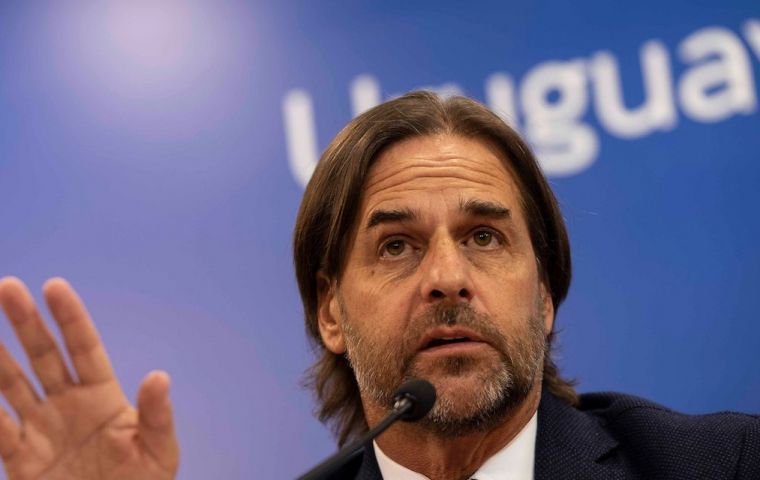MercoPress. South Atlantic News Agency
Lacalle Pou has 45% approval, study shows
 Lacalle's chances of running for a second term are yet to be gauged, the survey found
Lacalle's chances of running for a second term are yet to be gauged, the survey found Uruguayan President Luis Lacalle Pou was found to have a 45% approval rating according to a study by pollsters Cifra conducted during the month of August and released Thursday in Montevideo. The head of state who is nearing the end of his five-year term also had a 40% negative image, the survey showed.
Cifra Director Mariana Pomiés also explained that the remaining 15% of Uruguayans were neutral: They neither approved nor disapproved of Lacalle's performance. Thus, the National Party leader managed to keep an overall positive rapport among the population, despite a 2% drop from July's figures.
In addition, his new rating was one of the lowest over more than four years in office. While he hit his nadir in February this year when measured against the general constituency, he kept 85% support from within his own party's ranks, with 9% of “whites” remaining indifferent and only 6% of them disapproving of the head of state.
Within the Colorado Party -the other main political force in the ruling Multicolor alliance- 83% of the “reds” stood behind Lacalle, 7% gave him the thumbs down and 10% remained unclear.
However, it was not all that straightforward for Lacalle within the entire Multicolor front, where he only snatched a 48% approval rating and a 40% rejection, with 12% of the coalition's voters expressing a neutral position.
Among voters of the opposition Broad Front (Frente Amplio - FA), 75% disapproved of Lacalle Pou's performance, while only 12% were okay with it and 13% remained indifferent.
According to Pomiés, this 12% approval may indicate that some voters would dissociate their perception of presidential performance from their future electoral decisions.
Lacalle Pou's performance also shows greater acceptance among swing voters, of whom 34% valued Lacalle's work positively, 30% negatively, and 36% preferred not to comment on it.
In comparative terms, Lacalle's ratings are far below those of his predecessor, the late Tabaré Vázquez's 63% in his first presidency (2005-2010) and José Mujica's 52% (2010-2015). But Lacalle is still outperforming Vázquez's 34% in his last term (2015-2020).
In this scenario, Lacalle's political strength for the 2029 elections is yet to be gauged in a country where heads of state may not be chosen for consecutive terms.
“He is better than the one who made the party lose, but he is not as good as those who retained the government were, he is in the middle,” Pomiés argued.
Bottom line: The next few months will be key to see how the electoral prospects of Lacalle Pou and his party will develop.




Top Comments
Disclaimer & comment rulesCommenting for this story is now closed.
If you have a Facebook account, become a fan and comment on our Facebook Page!